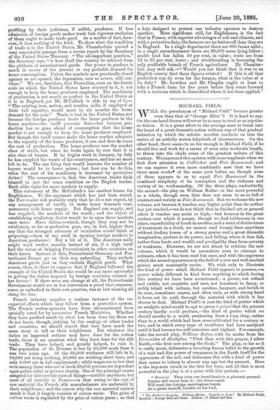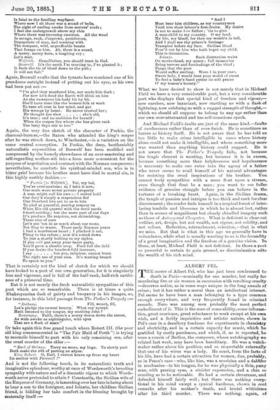MICHAEL FIELD.
WILL the pseudonym of "Michael Field" become greater even than that of "George Eliot "? It is hard to say. On the one hand drama will never be as easy to read or as popular
as fiction. It is a great effort to the average man to break into the heart of a great dramatic action without any of that gradual initiation by which the artistic novelist conducts us into the centre of an artfully woven labyrinth of circumstance. On the other hand, there seems to us fire enough in Michael Field, if he should live and work for a career of even very moderate length, to throw into the shade some of the greatest writers of this century. We expressed this opinion with some emphasis when we first drew attention to Callirrhoe and Fair Rosamund; and we can express it even more confidently now that we have three more works* of the same poet before us, though none of them appears to us to equal Pair Rosamund in the combined simplicity of its conception and the richness and variety of its workmanship. Of the three plays, undoubtedly the second—the play on William Rufus—is the most powerful as a whole, though even that does not seem to us so full of contrast and variety as Fair Rosamund. Bat we welcome the new volume, not because it touches any higher point than its author has yet reached,—we do not think that in finished art or general effect it reaches any point so high,—bat because in the great surface over which it passes, though we find balduesses in one place, superficiality of touch in another, and a want of distinctness of treatment in a third, we cannot read twenty lines anywhere without finding traces of a strong genius and a great dramatic imagination, profuse in its power, and failing, where it does fail, rather from baste and wealth and prodigality than from poverty or weakness. However, we are not about to criticise the new volume, which it would be premature even to attempt to estimate, when it has been read but once, and with the eagerness which the second appearance in the field of a new and well-marked genius must necessarily excite. We wish only to illustrate the kind of power which Michael Field appears to possess,—a power widely different in kind from anything to which during this century we have been accustomed,—a power, not refined and subtle, not exquisite and rare, not luxuriant in fancy, or richly inlaid with culture, but careless, buoyant, and lavish in its ease, sometimes coarse, and often rude, as with strong band it hews out its path through the material with which it has chosen to deal. Michael Field's is just the kind of genius which
an analytic mind would be apt to prove a priori that the present century hardly could produce,—the kind of genius which we
should ascribe to a world awakening from a long sleep, rather than to a world which had been over-cultivated for a century or two, and in which every type of excellence had been analysed until it had become too self-conscious and vigilant. For example, take the second play, William Rufus, with its motto from the Eumenides of Aschylus, "First then with this prayer, I adore Earth,—the first seer among the Gods." The play, so far as it is really great, delineates a brooding Saxon belief in the growth of a vast and dim power of vengeance in the Earth itself for the oppressors of the soil, and delineates this with a kind of power that seems to belong to almost any age but the present. Here is the key-note struck in the first few lines, and all that is most powerful in the play is of a piece with this prelude :—
" Beoweif. They tarn oar bread-lands to a pleasant ground. Nature will never bear it : the fierce earth Will rend the foreign, sacrilegious hands As a great mastiff, humble to his lord,
Is fatal to the fondling wayfarer.
Where now I sit there was a sound of bells, The sight of curling smoke from cotters' roofs ; I feel the undergrowth above my chin Where there was browsing common. All the wood Is savage, rank, o'ergrown, pestiferous, Depopulate of man, and teeming with The rampant, wild, unprofitable beasts That forage on him. Ab, there is a sound, A merry, merry horn, a laughing cry; Let's wait.
Wilfrith. Grandfather, you should treat in God.
Beowulf. It's the earth I'm trusting to, I've planted it ;
It feels the tie of blood down to the pith; It will not fail."
Again, Beowulf exults that the tyrants have murdered one of his grandsons outright instead of putting out his eyes, as his own had been put out :
"I'm glad they murdered him' not made him dark ; For now he's dead the Earth will think on him As she unweares his body bit by bit.
She'll have time like the women-folk at work To turn all over in her mind, and get His wrongs by heart. He never trusted her ; He thought her slow she's old, It's true; and no ambition for herself : When the corpse lies where she has given suck The lusty days stir in her."
Again, the very fine sketch of the character of Purkis, the charcoal-burn er,—the Saxon who attended the king's corpse after he was struck down, to Winchester,—is a variation on the same central conception. In Purkis, the deep, heathenishly naturalistic superstition of Beowulf has been modified and compressed by the homely shrewdness of an over-mastering and self-regarding mother-wit into a form more convenient for the purpose of negotiation and contract with the Norman conquerors; nevertheless, he comforts his spiritual-minded son, who is in bitter grief because his brother must have died in mortal sin, in this highly earthly fashion :— "Purkis [to TR/frith]. Tut, my lad,
You're over-anxious; as I take it now, Our souls were never private property A man might call his own ;—I rather hold Our duty's simply a stupendous fief Our Overlord lets out to us in bits To plod at peaceful, putting armour on When His old quarrel with the devil needs Sword-settling; but the more part of our days It's produce He requires, not skirmishing.
These sins of ours Let's put 'em in as muck about our roots, Not fling to waste. Those early Norman years I had a murderous heart ; I plucked it oat, Flung to the refuse ; now it's rotted down To jest a sturdy holding to my rights.
If you tvii/ put away your baser parts,
You'll grow a slender crop. Feed full the field If you desire the hundred-fold increase,
I say but you, religious, cannot learn The right use of your sins. It's wasting breath To speak to you."
That is certainly not the kind of sketch for which we should have looked to a poet of our own generation, for it is singularly free and vigorous, and is full of the half-rank, half-rich earthiness of a primeval time.
But it is not merely the fresh naturalistic sympathies of this poet which are BO remarkable. There is at times a quite Shakespearian dash of gaiety and buoyancy in his images, as, for instance, in this brief passage from The Father's Tragedy :— " Rothsay. Fill, wench, fill,
Let's pledge the newest beauty. What coy nymph Hath listened to thy tongue, my soothing John ?
Ramorgny. Faith, there's a merry dozen down the street,
As wide awake as nightingales, with eyes That are a flock of stars."
Or take again this free grand touch where Robert III. (the poor old king commemorated in "The Fair Maid of Perth ") is trying to reconcile himself to part with his only remaining son, after the cruel murder of the elder :—
"Earl of Orkney. Tarry no more, my liege. To slowly part Doth make the rift of parting an abyss. King Robert. 0, Earl, I cannot heave up from my heart Its anchor with Farewell !"
And is not the following touch, in its naturalistic truth and imaginative splendour, worthy at once of Wordsworth's brooding sympathy with nature and of a dramatic vigour to which Wordsworth never pretended to attain ? Constantia, the Sicilian wife of the Emperor of Germany, is lamenting over her fate in being about to bear a son to the foreigner, and Iolante, her childless Sicilian friend, is bidding her take comfort in the blessing brought by maternity itself :—
"And!
Must bear him children, as my countrymen Yield him their labour's first-fruits. My desire Is not to make him father ; 'tis to give A. man-child to my country. 0 my land, My life, my blood, for thee my womb's in toil, And I shall see thy prince's heritage
Trampled before my face. Sicilian blood Pour'd out by him who bath begot my child. This is distraction.
lelante. Such distraction waits On motherhood, my queen ; full treasuries Bring terrors and forebodings of the thief ; Pangs that the poor
Would suffer smiling. Were 1 in your ones, Sweet lady, I would bear your world of cares To feel a babe's hand patter its soft praise 0' my bosom's bounty."
What we have desired to show is not merely that in Michael Field we have a very considerable poet, but a very considerable poet who displays that special kind of freedom and rigour,— now careless, now luxuriant, now startling us with a flash of lightning, now subduing us with a rugged strength of thought,— which we should all suppose to belong to any age rather than our own over-attenuated and too self-conscious epoch.
And Michael Field's faults are just of the same kind,—fanfte of carelessness rather than of over-finish. He is sometimes as barren as history itself. He is not aware that he has told us too little to make crime intelligible in cases where history alone could not make it intelligible, and where something more was wanted than anything history could suggest. He is not aware that The Father's Tragedy fails, not because the tragic element is wanting, but because it is in excess, because something more than helplessness and hopelessness is necessary to make one enter into the agony of a father who never seems to avail himself of his natural advantages for resisting the cruel inspirations of his brother. You cannot truly sympathise with a mere float upon a stream, even though that float be a man ; you want to see fuller evidence of genuine struggle before you can believe in the tortures of a breaking heart. Again, in the Sicilian drama, the tangle of passion and intrigue is too thick and rank for clear discernment; the reader feels himself in a tropical forest of interlacing tendrils and blossoms in which he is almost lost, rather than in scenes of magnificent but clearly chiselled imagery snob as those of Antony and Cleopatra. What is deficient is clear-cut outline, art, design, but not wealth, not vigonr, not solidity, and not colour. Reflection, retrenchment, selection,—that is whet we miss. But that is what in this age we generally have in redundance, while what is usually wanting to us is the fecundity of a great imagination and the freedom of a genuine vision. In these, at least, Michael Field is not deficient. In those a poet so powerful is certain to gain ground, as discrimination sifts the wealth of his rich mind.



































 Previous page
Previous page